- Home
- Jodi Picoult
House Rules Page 21
House Rules Read online
Page 21
Even then I knew that if Jacob was the one who made her cry, I was the one who had to stop it.
Of course I know where they are; my mother has called me from the courthouse. But that doesn't keep me from being unable to concentrate on Civitas or Geo until they come home.
I wonder if my teachers will accept that as an excuse: Sorry I didn't get my homework done: my brother was being arraigned.
Sure, my geometry teacher will say. Like I haven't heard that one a thousand times.
The minute I hear the door open, I run into the mudroom to find out what happened.
My mother walks in, alone, and sits down on the bench where we usually dump our school backpacks.
--Where's Jacob?|| I ask, and very slowly she looks up at me.
--In jail,|| she whispers. --Oh, my God, he's in jail.|| She bends at the waist until she is doubled over.
--Mom?|| I touch her shoulder, but she doesn't move. It scares me to death, and it's eerily familiar.
It takes me a second to place it--the way she's staring off into space, the way she won't respond: this is how Jacob looked last week, when we couldn't get him to come back to us.
--Come on, Mom.|| I slip an arm around her waist and lift her. She feels like a bag of bones. I guide her upstairs, wondering why the hell Jacob is in jail. Aren't you supposed to be guaranteed the right to a speedy trial? Could it have been that speedy? If only I'd done my Civitas homework, maybe I'd understand what had happened, but this much I know: I am not about to ask my mother.
I sit her down on the bed and then I kneel and take off her shoes. --Just lie down,|| I suggest, which seems like something she'd say if the tables were turned. --I'll get you a cup of tea, okay?||
In the kitchen I set the kettle to boil and have a tsunami of deja vu: the last time I did this--boil a kettle, take out a tea bag, and hook its paper tag over the edge of a mug--I was in Jess Ogilvy's house. It's really just a matter of luck that Jacob's the one sitting in jail right now, and I'm here. It could easily have been the other way around.
Part of me is relieved about that, which makes me feel like total crap.
I wonder what the detective said to Jacob. Why my mother brought him down there in the first place. Maybe that's why she's so messed up now: not grief but guilt. That much, I understand. If I'd gone to the cops and told them I had seen Jess alive and naked earlier that day, would it have made matters worse for Jacob, or better?
I don't really know how my mother takes her tea, so I put in milk and sugar and carry it upstairs. She is sitting up now, the pillows piled behind her. When she sees me, she tears up. --My boy,|| she says, as I sit down beside her. She cups her hand around my cheek.
--My beautiful boy.||
She might be talking about me, and she might be talking about Jacob. I decide it doesn't really matter.
--Mom,|| I ask. --What's going on?||
--Jacob has to stay in jail ... for two weeks. Then they'll take him to court again to see if he's competent to stand trial.||
Okay, I may not be a rocket scientist, but sticking someone who may not be able to handle a trial in jail doesn't seem like the best way to see if they're able to handle a trial. I mean, if you can't handle a trial, how the hell could you handle jail?
--But . . . he hasn't done anything wrong,|| I say, and I look carefully at my mother, to see if she knows more than I do.
If she does, she's not showing it. --That doesn't seem to matter.||
Today in Civitas we talked about the cornerstone of our country's legal system: that you're innocent until proven guilty. Locking someone up in jail while you try to figure out what to do next doesn't seem like you're giving him the benefit of the doubt. It sounds like you're already assuming he's screwed, so he might as well get comfortable in his future living quarters.
My mother tells me how Jacob got suckered into talking to the detective. How she ran to find him a lawyer. How Jacob was arrested in front of her. How he decked the bailiffs when they tried to grab his arms.
I don't understand why this lawyer wasn't able to get Jacob released and back home. I read enough Grisham novels to know that happens all the time, especially for people who don't have a previous record.
--So what happens now?|| I ask.
I don't just mean for Jacob, either. I mean for us. All those years I wished Jacob didn't exist, and now that he's not in the house, it's like there's an elephant in the room.
How am I supposed to make a can of soup for dinner, knowing that my brother is in a cell somewhere? How am I supposed to get up in the morning, go to school, pretend that this is life as usual?
--Oliver--that's the lawyer--says that people get unarrested all the time. The police get some new evidence, and they let the original suspect go.||
She is holding on to this like it's a lucky charm, a rabbit's foot, an amulet. Jacob will be unarrested, and we can all go back to the way we were. Never mind that the way we were wasn't that terrific, or that unarrested doesn't mean the slate is wiped entirely clear so you forget what happened. Imagine spending twenty years in prison for a crime you never committed before you're acquitted thanks to DNA evidence. Sure, you're free now, but you don't get back those twenty years. You don't ever stop being --that guy who used to be in prison.||
Because I don't know how to say this to her--and I'm sure she wouldn't want to hear it, anyway--I reach for the remote control on her nightstand and turn on the TV that's sitting on the dresser across the room. The news is on, the weatherman predicting a storm sometime next week. --Thanks, Norm,|| the anchorwoman says. --Breaking news in the case of the murder of Jessica Ogilvy ... Police have arrested eighteen-year-old Jacob Hunt of Townsend, Vermont, in connection with the crime.||
Beside me, my mother freezes. Jacob's school photo fills the screen. In it, he is wearing a striped blue shirt and, as usual, not staring at the camera. --Jacob is a senior at Townsend Regional High School and was tutored by the victim.||
Holy shit.
--We'll have more on this story as it develops,|| the anchor promises.
My mother lifts the remote control. I figure she is going to turn off the television, but instead, she hurls it at the screen. The remote breaks apart, and the TV screen cracks.
She rolls onto her side.
--I'll get the broom,|| I say.
In the middle of the night, I hear noises in the kitchen. I creep downstairs to find my mother, rummaging through a drawer to find the phone book. Her hair is loose, her feet are bare, and there's a toothpaste stain on her shirt. --Why isn't it listed under Government,'||
she mutters.
--What are you doing?||
--I have to call the jail,|| she says. --He doesn't like it when it's dark. I could bring him a night-light. I want them to know that I can bring him a night-light, if that helps.||
--Mom,|| I say.
She picks up the telephone.
--Mom ... you need to go to bed.||
--No,|| she corrects. --I need to call the jail--||
--It's three in the morning. They're asleep.|| I look at her. --Jacob's asleep.||
She turns her face to mine. --Do you really think so?||
--Yeah,|| I say, but the word has to squeeze itself out around the knot in my throat.
--Yeah, I do.||
Here are the things I am afraid of:
That the subject Jacob loves the most has stopped being an interest and has started to become an obsession.
That this is why he's in jail in the first place.
That when he was last with Jess, something made him feel scared, or cornered, which is what makes him snap.
That you can love someone and hate him at the same time.
That age has nothing to do with who is the older brother.
If you think having a brother who's got Asperger's makes me a pariah, imagine having one who's in jail. The next day I am in school--yes, more on that later--and everywhere I go, I hear the whispers.
I heard he cut off her finger with
a knife and kept it.
I heard he hit her with a baseball bat.
I always thought he was creepy.
The reason I'm taking up space in my classes today--and believe me, that's all I'm doing, since my brain is too busy blocking the gossip I overhear--is that my mother thought it was the best plan. --I have to go to the jail,|| she said, which I had figured would happen. --You can't stay home for two weeks. You have to go back sometime.||
I knew she was right, but didn't she also realize that people were going to ask about Jacob? Make assumptions? And not just the kids. Teachers would come up to me full of fake sympathy when what they really wanted was some dirt they could take back to the teachers' lounge. The whole thing made me feel sick to my stomach.
--What am I supposed to say if someone asks?||
My mother hesitated. --Tell them your brother's attorney said you can't talk about it.||
--Is that true?||
--I have no idea.||
I took a deep breath. I was going to come clean, to tell her about breaking into Jess's house. --Mom, I have to talk to you about something ...||
--Can I take a rain check?|| she said. --I want to be there when the doors open at nine.
There's plenty of cereal for breakfast, and you can take the bus.||
Now, I'm sitting in biology next to Elise Howath, who is a pretty good lab partner even if she's a girl, when she slips a note to me.
I'm really sorry to hear about your brother.
I want to thank her, for being nice. For being the first person to give a shit about Jacob instead of crucifying him like the media and the stupid court already have for what he's done.
What he's done.
I grab my backpack and run out of class, even though Mr. Jennison is still yammering away, and he doesn't even comment (which tells me, more than anything, that this is not my life but a parallel universe). I keep walking down the hall without a hall pass, and no one stops me. Not when I cruise past the principal's office and the guidance department. Not when I bust through the double doors near the gym into the blinding light of afternoon and start walking.
Apparently in the public schools, if you have a relative arrested for murder, the administration and teachers pretend you are invisible.
Which, to be honest, isn't really all that different from the way I was treated before.
I wish I had my skateboard with me. Then I could move faster, maybe outdistance the facts that keep circling in my head:
I saw Jess Ogilvy alive and well. Shortly after that, Jacob went to her house.
Now she's dead.
I've seen my brother put a chair through a wall and smash a window with his hand.
I've been in his way, sometimes, when he has a meltdown. I've got the scars to prove it.
You do the math.
My brother is a murderer. I test the words under my breath and immediately feel a pain in my chest. You can't say it the way you'd say My brother is six feet tall or My brother likes scrambled eggs, even if they are all accurate facts. But the Jacob I knew a week ago is no different than the Jacob I saw this morning. So does that mean I was too stupid to notice some major flaw in my brother? Or that anyone--even Jacob--might suddenly turn into a person you never imagined?
I sure as hell qualify.
All my life I've thought I have nothing in common with my brother--and it turns out we are both criminals.
But you didn't kill anyone.
The voice echoes in my head, an excuse. For all I know, Jacob's got his reasons, too.
That makes me run faster. But I could be a goddamned bullet and still not manage to outstrip the sad fact that I'm no better than those assholes at school: I have already assumed my brother is guilty.
Behind the school, if you go far enough, you hit a pond. It's a community hot spot in the winter--on weekends someone lights a bonfire and brings marshmallows to roast; and a few enterprising hockey dads sweep the ice with wide shovels so that pickup games can break out all across its surface. I step onto the ice, even though I don't have skates with me.
It's not crowded on a weekday. A few moms with toddlers, pushing milk crates as they learn to skate. An old man in those black figure skates that always make me think of Holland, or the Olympics. He's doing figure eights. I dump my backpack on the edge of the snow and shuffle my feet little by little, until I am standing dead center.
Every year there's a competition in Townsend to see when the ice will fully melt.
They stick a pole in the ice that's attached to some kind of digital clock, and when the ice melts enough for the pole to tilt, it trips a switch and records that moment in time. People put money down on which day and hour the ice will melt, and the person with the closest guess gets the jackpot. Last year, I think it was about $4,500.
What if the moment the ice melted was right now?
What if I went under?
Would those kids skating around hear the splash? Would the old man come to my rescue?
My English teacher says a rhetorical question is one that's asked even though an answer isn't expected: Is the Pope Catholic? Or Does a bear crap in the woods?
I think it's a question that has an answer you don't really want to hear.
Does this dress make me look fat?
Are you really that stupid?
If the ice melts and no one sees me go under, did I ever really exist?
If I were the one in jail, would Jacob believe the worst of me?
Just like that, I sit down in the middle of the pond, on the ice. It's cold through my jeans. I picture myself freezing from the inside out. They will find me and I'll be a sculpture, a statue.
--Hey, kid, you okay?|| The old man has skated over to me. --You need some help?||
Like I said: an answer you don't really want to hear.
I didn't sleep much last night, but when I did, I dreamed. I dreamed that I was breaking Jacob out of jail. I did it by reading through all his CrimeBusters notebooks and copying the behavior of cat burglars. As soon as I rounded the corner of the prison where Jacob was being kept in a cell, he was ready. Jacob, I said, you have to do exactly what I tell you to do, and he did, which is how I knew it was a dream. He was quiet, and he followed my lead, and he didn't ask any questions. We tiptoed past the guard booth, and we both hopped into a giant trash bin, covering ourselves with paper and garbage. The custodian finally came and wheeled us right through the buzzers and the locked gate, and just as he was about to dump the giant trash bin into the Dumpster outside, I yelled, Now! and Jacob and I jumped out and started running. We ran for hours, until the only things following us were falling stars, and then we finally stopped in a field of tall grass and laid down on our backs on the ground.
I didn't do it, Jacob told me.
I believe you, I said, and it was really true.
On that day when Jacob was supposed to make a friend for homework, those two little girls he met in the sandbox had to leave. They ran off without saying good-bye, leaving my thirteen-year-old brother alone and digging in the sand.
I was afraid to look at my mother again. So instead, I walked to the sandbox and sat down on the edge. My knees came up to my chin; I was too big for the space--it was crazy to see my brother squeezed into it. I picked up a rock and started to paw through the sand with it.
--What are we looking for?|| I asked.
--Allosaurus,|| Jacob replied.
--How are we going to know when we find it?||
Jacob's face lit up. --Well, its vertebrae and skull won't be as heavy as those of other dinosaurs. That's what the name means, translated: different lizard. ||
I imagined any kid Jacob's age watching him play paleontologist in a sandbox and wondered if he'd ever have a friend.
--Theo,|| he suddenly whispered, --you know we're not really going to find allosaurus in here.||
--Um, yeah. || I laughed. --But if we did, that would be some story, wouldn't it?||
--The news vans would come,|| Jacob said.
> --Screw the news, we'd be on Oprah, || I told him. --Two kids who find a dinosaur skeleton in a sandbox. We might even wind up on the Wheaties box.||
--The fabulous Hunt brothers.|| Jacob grinned. --That's what they'd call us.||
--The fabulous Hunt brothers,|| I repeated, and I watched Jacob dig to the bottom with his shovel. I wondered how long it would be before I outgrew him.
Jacob
I don't really understand what's happening.
At first I thought maybe this was protocol, like the way that my mother was wheeled out of the hospital after she gave birth to Theo, even though she could easily have walked and carried him in her arms. Maybe it was a liability issue, which is why the bailiffs had to get me out of the courtroom (this time they were a little more hesitant to touch me). I assumed they would lead me to the front of the building, or maybe to a loading dock where defendants could be picked up and taken home.
Instead, I was stuffed into the back of a police car and driven two hours and thirty-eight minutes to jail.
I do not want to be in jail.
The officers who drop me off are not the same ones who take me into the jail. This new one wears a different colored uniform and asks me the same questions that Detective Matson asked me at the police station. There are fluorescent lights on the ceiling, like they have at Walmart. I don't enjoy going to Walmart for this very reason--the lights spit and hiss sometimes due to their transformers, and I worry that the ceiling will collapse on me.
Even now, I cannot speak without glancing up at the ceiling every few moments. --I'd like to call my mother now,|| I say to the officer.
--Well, I'd like a winning lottery ticket, but something tells me neither of us is going to get what we want.||
--I can't stay here,|| I tell him.
He's still typing on his computer. --I don't remember asking for your opinion.||
Is this man particularly thickheaded? Or is he trying to annoy me? --I'm a student,|| I explain, the same way I might explain mass spectrometry to someone who doesn't have a clue about trace evidence analysis. --I have to be at school by seven forty-seven in the morning, or else I won't have time to get to my locker before class.||

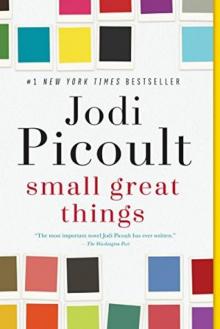 Small Great Things
Small Great Things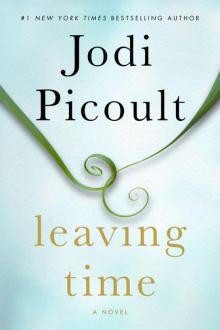 Leaving Time
Leaving Time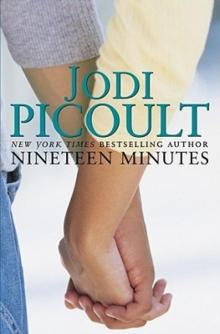 Nineteen Minutes
Nineteen Minutes Larger Than Life
Larger Than Life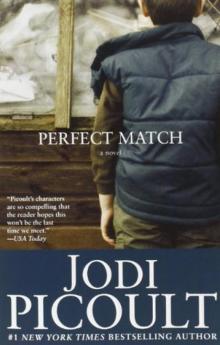 Perfect Match
Perfect Match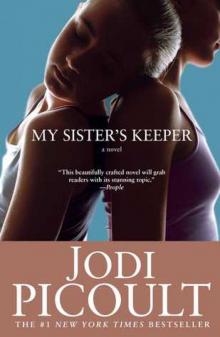 My Sister's Keeper
My Sister's Keeper The Pact
The Pact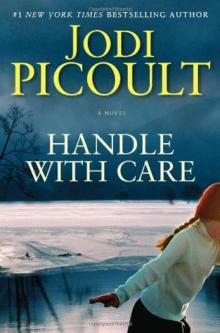 Handle With Care
Handle With Care Songs of the Humpback Whale
Songs of the Humpback Whale Mermaid
Mermaid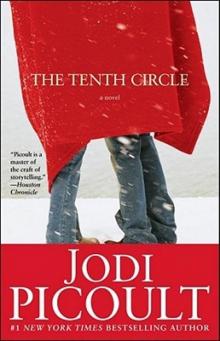 The Tenth Circle
The Tenth Circle The Color War
The Color War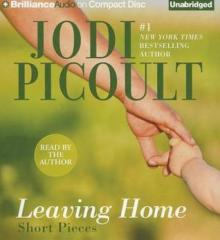 Leaving Home: Short Pieces
Leaving Home: Short Pieces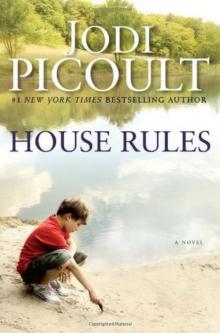 House Rules
House Rules Lone Wolf
Lone Wolf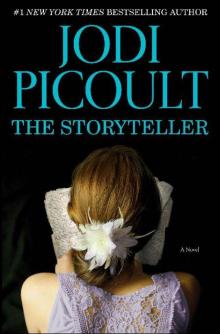 The Storyteller
The Storyteller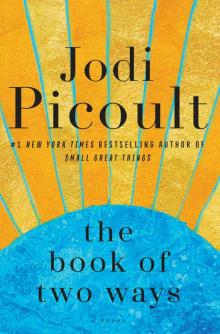 The Book of Two Ways
The Book of Two Ways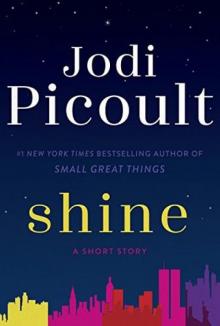 Shine
Shine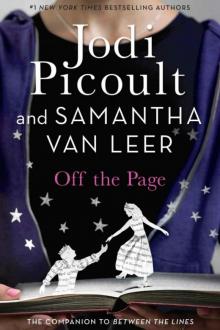 Off the Page
Off the Page Sing You Home
Sing You Home Second Glance: A Novel
Second Glance: A Novel Mercy
Mercy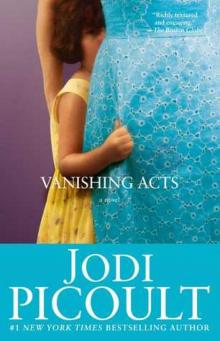 Vanishing Acts
Vanishing Acts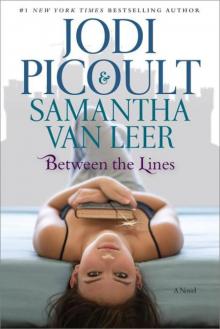 Between the Lines
Between the Lines Plain Truth
Plain Truth Salem Falls
Salem Falls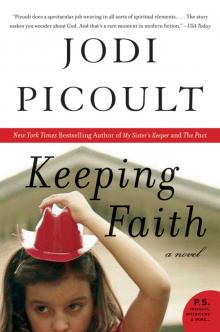 Keeping Faith
Keeping Faith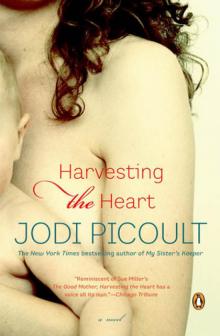 Harvesting the Heart
Harvesting the Heart Change of Heart
Change of Heart Where There's Smoke
Where There's Smoke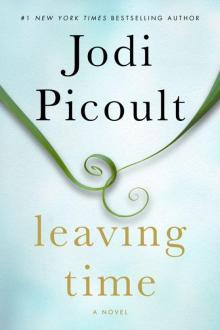 Leaving Time: A Novel
Leaving Time: A Novel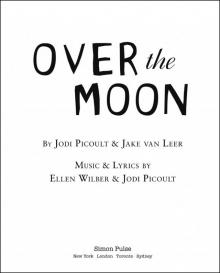 Over the Moon
Over the Moon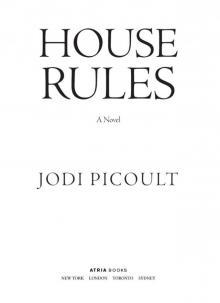 House Rules: A Novel
House Rules: A Novel The Jodi Picoult Collection #2
The Jodi Picoult Collection #2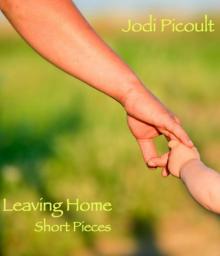 Leaving Home: Short Pieces (Kindle Single)
Leaving Home: Short Pieces (Kindle Single)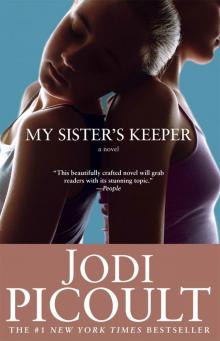 My Sister's Keeper: A Novel
My Sister's Keeper: A Novel![Mermaid [Kindle in Motion] (Kindle Single) Read online](http://i1.bookreadfree.com/i1/04/03/mermaid_kindle_in_motion_kindle_single_preview.jpg) Mermaid [Kindle in Motion] (Kindle Single)
Mermaid [Kindle in Motion] (Kindle Single)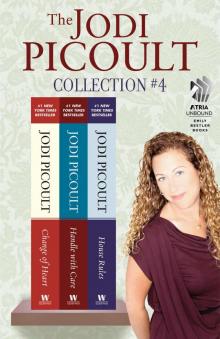 The Jodi Picoult Collection #4
The Jodi Picoult Collection #4 Sing You Home: A Novel
Sing You Home: A Novel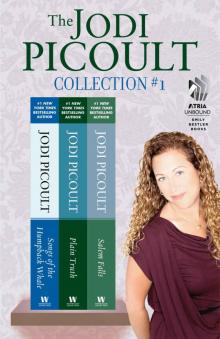 The Jodi Picoult Collection
The Jodi Picoult Collection Lone Wolf A Novel
Lone Wolf A Novel Second Glance
Second Glance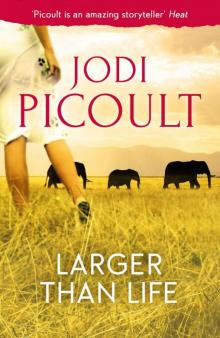 Larger Than Life (Novella)
Larger Than Life (Novella)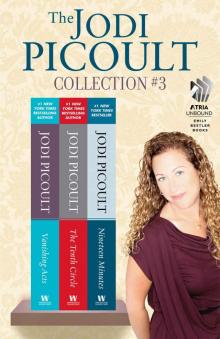 The Jodi Picoult Collection #3
The Jodi Picoult Collection #3